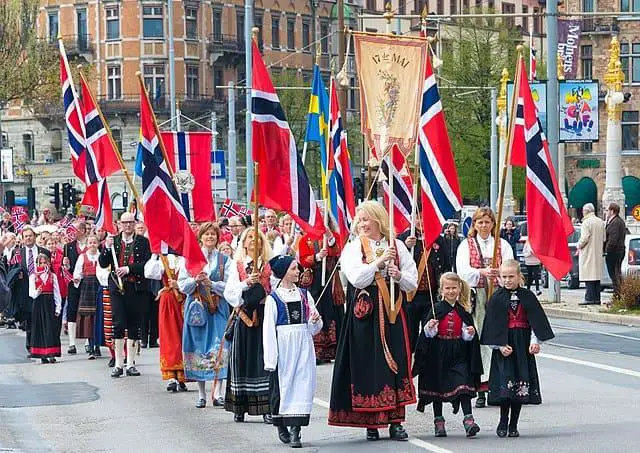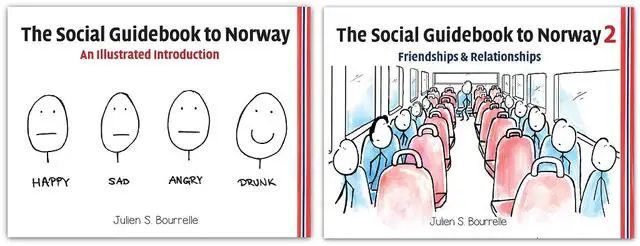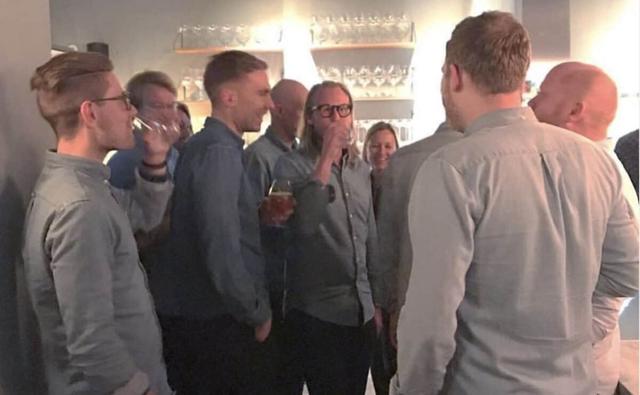“Unveiling the Rich Cultural Tapestry of Norwegians: Exploring Traditions, Heritage, and Achievements”
Understanding Norwegian Culture and Customs

Norway, like Sweden, is known for its strong middle class and comprehensive social security system. The country also places a high value on patriotism, with Norwegians taking pride in their nation, towns, and regions. When it comes to greetings, shaking hands is customary in both business and social settings. It is important to shake hands with everyone present, including men, women, and children. Younger people may not shake hands when meeting friends, but older individuals expect a handshake when being greeted or when leaving.
Similar to Swedes, Norwegians tend to be reserved in their body language and do not often embrace or touch in public. Maintaining eye contact while talking with someone is considered polite. Punctuality is highly valued in business meetings, so it is essential to be on time or call with an explanation if you are delayed.
In terms of communication, using last names and appropriate titles until specifically invited to use first names is customary. English is commonly used in business interactions, so an interpreter is rarely necessary. Business cards in English are acceptable.
During business meetings in Norway, it is common for participants to quickly get down to business after brief cordialities. Agendas are usually set with a clear purpose for the meeting. Norwegians are known for being factual, practical, precise, reserved, and getting straight to the point. Therefore, it is important to be clear and concise when communicating expectations.
Presentations hold significance in Norwegian culture as well. They should be clear, detailed, and focused on the main points. Reports, briefings, and presentations should be supported by facts, figures tables and charts.
Negotiations can be tough with Norwegians as they are methodical and detail-oriented. They may be slow to change their positions and will push hard for concessions during negotiations.
In terms of decision-making processes within companies in Norway, it is important to understand the corporate structure and know who holds decision-making authority. While decision-making may be a slow process, implementing decisions can often be rapid.
When it comes to social etiquette, it is not common to call a Norwegian businessperson at home unless there is an important reason and a well-established relationship. To beckon a waiter in Norway, wave your hand and make eye contact.
Business entertaining is typically done in restaurants during lunch or dinner. Business breakfasts are acceptable but less common than in the United States. Business discussions can take place at any time during a meal. Spouses may also be included in business dinners.
Toasting is considered a formal ritual in Norway. It is important to wait for the host to give a toast before taking a drink. When making a toast, maintain eye contact and nod to others present before putting your glass down. After making a toast, men should wait for women to put their glasses down first.
The meal ends with the male guest of honor tapping his glass with a knife or spoon and thanking the hostess on behalf of all guests. The female guest of honor should also express gratitude towards the host. It is customary to ask for permission before smoking.
During meals, it is polite to keep your hands on the table at all times rather than in your lap. Elbows should be kept off the table as well. It is expected to try everything served during the meal.
After finishing eating, place the knife and fork side by side on the plate at the 5:25 position. Sending a thank-you note or calling the next day to express gratitude towards your host and hostess is considered good manners.
It is not appropriate to ask for a tour of someone’s home unless there is already an established relationship with that person.
Norwegians tend to dress fashionably but often casually in warm European-style clothing. Being well-dressed in public at all times is important. For business settings, men should wear conservative suits and ties, while women can opt for dresses, suits, or pantsuits.
Gifts are generally not exchanged in business interactions, but it is common to give small Christmas gifts to Norwegian colleagues. Gifts representative of one’s business or home area are appropriate. When invited to someone’s home, it is customary to bring a small gift for the hostess. If the host has children, a small gift of candy is appreciated. Flowers (unwrapped before giving), wine (liquor can be special as it is expensive in Norway), chocolates, books, and recorded music are suitable gift options. Crystal or items made in Norway should be avoided.
Having knowledge about Norway’s economy, high standard of living, sports, architecture, history, and other aspects of the country is appreciated when engaging in conversations with Norwegians.
Remembering to thank someone for dinner or a gift upon the next meeting is considered polite. Men should tip their hats to women and remove their hats while talking to women.
Avoid praising another city or area in Norway over the one you are currently visiting as Norwegians take great pride in their own towns and regions. It is also important not to criticize Swedish lifestyle, sexual habits, suicide rate, prices, or any other sensitive topics.
Norway boasts one of the highest percentages of working women in the world at 48% of its workforce. Foreign businesswomen are widely accepted and should encounter few problems conducting business in Norway.
Businesswomen may pay the check at a restaurant without any embarrassment.
These customs and cultural practices will help navigate social and business interactions successfully while respecting Norwegian culture.
Business Etiquette for Interacting with Norwegians

Norway, like Sweden, is also a predominantly middle-class country with a strong social security system. Patriotism is highly valued in Norway, and Norwegians take great pride in their nation and local communities. When meeting Norwegians for business or social purposes, it is customary to shake hands with everyone present, including men, women, and children. Handshakes should also be exchanged when leaving. However, unlike in Sweden, younger people in Norway may not always shake hands when meeting friends.
Similar to Swedes, Norwegians are reserved in their body language and do not often embrace or touch in public. Maintaining eye contact during conversations is important and demonstrates attentiveness and respect. Punctuality is highly valued in Norwegian business culture, so it is crucial to arrive on time for meetings. If there is a delay, it is considered polite to call ahead with an explanation.
In terms of addressing colleagues or business partners, it is customary to use last names and appropriate titles until specifically invited to use first names by the Norwegian host or colleague. English is commonly spoken in business settings in Norway, so an interpreter is rarely necessary. Business cards in English are acceptable.
During business meetings with Norwegians, it is common for them to get straight down to business after brief cordialities. Agendas are typically set beforehand with a clear purpose for the meeting. Norwegians value factual information and appreciate concise communication. When communicating with them, it is important to be clear about expectations and provide detailed information when necessary.
Presentations hold significance in Norwegian business culture as well. They should be clear, focused on key points, and supported by facts, figures, tables, and charts whenever possible. Negotiations with Norwegians can be challenging as they tend to be methodical and detail-oriented. They may push hard for concessions and be slow to change their positions.
In the private sector, it is important to understand the corporate structure and know who holds decision-making authority. While decision-making processes may be slow, once a decision is made, implementation can be swift. It is generally not appropriate to call a Norwegian businessperson at home unless it is of utmost importance and there is an established relationship.
When dining in Norway, it is common for business entertaining to take place in restaurants during lunch or dinner. Business breakfasts are less common compared to the United States but can still be acceptable. Business discussions can occur throughout the meal. If spouses are included in business dinners, the female guest of honor is typically seated to the right of the host, while the male guest of honor sits to the left of the hostess.
Toasting is considered a formal ritual in Norway as well. It is customary to wait for the host or senior individuals present to initiate a toast before taking a drink. Eye contact should be made with each person being toasted, and “Skål” (pronounced “skohl”) should be said. After making a toast, it is polite for men to wait for women to put their glasses down first.
At the end of a meal, it is customary for the male guest of honor to tap his glass with a knife or spoon and thank the hostess on behalf of all guests. The female guest of honor should also express gratitude towards the host. When eating, keep your hands on the table at all times and avoid placing your elbows on it.
After attending an event or receiving a gift from Norwegians, it is courteous to send a thank-you note or make a phone call expressing gratitude. Avoid asking for tours of personal homes unless there is an established relationship.
Norwegians tend to dress in fashionable yet casual European-style warm clothing. It is important to dress well when in public or attending business meetings. Men should wear conservative suits and ties, while women can opt for dresses, suits, or pantsuits.
Gift exchange is not common in Norwegian business settings. However, small Christmas gifts are often exchanged among colleagues. When invited to someone’s home, it is customary to bring a small gift for the hostess. Gifts such as flowers (unwrapped), wine (liquor is expensive in Norway), chocolates, books, or recorded music are appropriate. Avoid giving crystal or items made in Norway.
Having knowledge about Norway’s economy, high standard of living, sports, architecture, history, and other aspects of the country is appreciated when interacting with Norwegians. Always remember to thank your host or colleague for dinner or gifts upon the next meeting.
In terms of gender equality in the workforce, Norway also boasts a high percentage of working women. Foreign businesswomen should encounter few obstacles when conducting business in Norway. It is acceptable for businesswomen to pay the bill at a restaurant without feeling embarrassed.
Lastly, it is important to avoid praising one city or region over another while visiting Norway. Norwegians take pride in their own towns and regions and may find comparisons disrespectful. Additionally, refrain from criticizing aspects of Norwegian lifestyle such as sexual habits, suicide rates, prices, etc. Insincere compliments are considered rude.
Overall, understanding and respecting Norwegian business etiquette will contribute to successful interactions and relationships with Norwegian colleagues and partners.
Key Tips for Successful Business Negotiations in Norway
![]()
Norway, like Sweden, is known for its high standard of living and strong social security system. When conducting business negotiations in Norway, it is important to keep the following tips in mind:
1. Build Trust and Establish Personal Connections
Similar to Swedes, Norwegians value personal relationships and trust in business dealings. Take the time to build rapport with your Norwegian counterparts before diving into the negotiation process. This can be done through small talk and getting to know each other on a more personal level. It is also common to shake hands when meeting and leaving, as well as maintain eye contact during conversations.
2. Be Prepared and Detail-Oriented
Norwegians appreciate thoroughness and attention to detail. Before entering negotiations, make sure you have done your research on the topic at hand and come prepared with facts, figures, and supporting documentation. Presentations should be clear, concise, and backed up by data. Norwegians are methodical negotiators who value precision.
3. Emphasize Equality and Collaboration
In Norway, hierarchy is not as pronounced as in some other cultures. It is important to treat everyone involved in the negotiation process with respect and equality. Encourage open discussion and collaboration among all parties involved, regardless of their position or rank within their organization.
Lists are not necessary for this expansion as it provides a general overview of key tips for successful business negotiations in Norway.
Navigating Social Interactions with Norwegians: Dos and Don’ts

Norway, like Sweden, is a predominantly middle-class country with a strong social security system. Patriotism is also important to Norwegians, who take pride in their nation, towns, and regions. When meeting Norwegians, it is customary to shake hands with everyone present, regardless of gender or age. This includes men, women, and children. It is also common to shake hands again when leaving. However, unlike in Sweden, younger people in Norway may not always shake hands when meeting friends.
Similar to Swedes, Norwegians tend to be reserved in their body language and do not often embrace or touch in public. Maintaining eye contact while talking with someone is considered polite and shows attentiveness. Punctuality for business meetings is highly valued in Norway, so it is important to be on time or call with an explanation if you are delayed.
In terms of addressing people, it is customary to use last names and appropriate titles until specifically invited by your Norwegian host or colleague to use first names. English is commonly used in business settings in Norway, so an interpreter is rarely necessary. Business cards in English are acceptable.
During business meetings with Norwegians, it is common for them to get right down to business after brief cordialities. Agendas are usually set beforehand with a clear purpose for the meeting. Norwegians are known for being factual, practical, precise, and reserved. They prefer concise communication and appreciate clarity regarding expectations.
Presentations are considered important in Norway as well. They should be clear, to the point, and detailed. Reports, briefings, and presentations should be supported by facts, figures, tables, and charts.
When it comes to negotiations with Norwegians, they are generally tough negotiators who can be methodical and detailed. They may be slow to change their positions and will push for concessions. It is important to be prepared and have a strong argument when negotiating with Norwegians.
In terms of social etiquette, it is not common to call a Norwegian businessperson at home unless it is important and you have a well-established relationship. When beckoning a waiter in Norway, you can wave your hand and make eye contact.
Business entertaining in Norway often takes place in restaurants during lunch or dinner. Business breakfasts are acceptable but less common than in the United States. Business discussions can happen at any time during a meal, and spouses may be included in business dinners.
When attending a dinner party in Norway, it is customary for the female guest of honor to be seated to the right of the host, while the male guest of honor is seated to the left of the hostess. Toasting is also an important ritual in Norway. It is polite to wait for the host to give a toast before taking a drink. Eye contact should be made with the person being toasted, and the word “Skål” (meaning “cheers”) should be said. After making a toast, it is customary for men to wait for women to put their glasses down first.
At the end of a meal, it is important to thank your host and hostess. Sending a thank-you note or calling them the next day is considered polite.
In terms of attire, Norwegians tend to wear fashionable yet casual European-style warm clothing. It is important to be well-dressed in public at all times.
Gifts are generally not exchanged in business settings in Norway, but small Christmas gifts are common among colleagues. When invited to someone’s home, it is customary to bring a small gift for the hostess. Flowers (unwrapped), wine (liquor), chocolates, books, and recorded music are appropriate gifts. Crystal or items made in Norway should be avoided.
Overall, it is important to show respect, be punctual, and maintain professionalism when interacting with Norwegians. Being knowledgeable about Norway’s culture, economy, sports, history, and architecture is appreciated. Avoid criticizing Norwegian lifestyle or making insincere compliments. With these guidelines in mind, navigating social interactions with Norwegians can be enjoyable and successful.
Building Strong Relationships with Norwegian Colleagues and Clients

Norway, like Sweden, values strong relationships in business. It is important to establish a good rapport with your Norwegian colleagues and clients. Similar to Swedes, Norwegians value punctuality and expect you to be on time for meetings. If you are delayed, it is considered polite to call with an explanation.
When meeting someone for the first time, it is customary to shake hands in Norway as well. However, unlike Sweden, Norwegians may also greet each other with a hug or a light kiss on the cheek among friends and acquaintances. Eye contact is important during conversations, just as it is in Sweden.
In terms of communication style, Norwegians appreciate directness and honesty. They prefer clear and concise communication without excessive small talk. Like Swedes, they are factual and get straight to the point quickly.
Norwegian business culture also emphasizes equality and inclusivity. Women hold prominent positions in the workforce, similar to Sweden. Foreign businesswomen should not encounter any issues conducting business in Norway.
To build strong relationships with Norwegian colleagues and clients, it is beneficial to show interest in their culture, history, sports, or other aspects of Norwegian life. This demonstrates respect and helps foster connections.
Gift-giving is not common in Norwegian business culture but can be appreciated on special occasions or during the holiday season. When invited to someone’s home, bringing a small gift for the host or hostess is customary.
Overall, building strong relationships with Norwegian colleagues and clients involves being punctual, direct yet respectful in communication, showing interest in their culture, and demonstrating appreciation for their hospitality when appropriate.
Essential Cultural Insights for Doing Business in Norway

Norway is known for its strong middle class and comprehensive social security system, similar to Sweden. The country takes pride in its patriotism, with Norwegians being very proud of their nation, towns, and regions. When meeting someone in a business or social setting, it is customary to shake hands with everyone present, including men, women, and children. This gesture should be repeated when leaving as well. However, younger people in Norway may not always shake hands when meeting friends. Older individuals generally expect a handshake when being greeted or bidding farewell.
In terms of body language, Norwegians are typically reserved and do not embrace or touch often in public. It is important to maintain eye contact while speaking with someone as it is considered respectful. Punctuality is highly valued in business meetings in Norway, and it is expected that you arrive on time. If there is a delay, it is courteous to call and provide an explanation.
When conducting business in Norway, it is common to use last names and appropriate titles until specifically invited by your Norwegian host or colleague to use first names. English is widely spoken in the business environment, so an interpreter is rarely necessary. Business cards in English are acceptable.
During meetings, Norwegians usually get straight to the point after brief cordialities. Agendas are clearly set with a stated purpose. Norwegians are known for being factual, practical, precise, reserved, and efficient communicators. It is essential to be clear and concise when detailing your expectations during communication with them.
Presentations hold significance in Norway and should be clear, detailed, and to the point. Reports, briefings, and presentations should be supported by facts, figures, tables, and charts.
Negotiations with Norwegians can be challenging as they are typically tough negotiators who are methodical and slow to change their positions. They may push hard for concessions, so it is important to be well-prepared and firm in your stance.
In the private sector, it is crucial to understand the corporate structure and know who holds decision-making authority. While decision-making processes may be slow, once a decision is made, implementation tends to be rapid.
It is generally not recommended to call a Norwegian businessperson at home unless it is important and you have an established relationship with them.
When beckoning a waiter in Norway, wave your hand and make eye contact.
Business entertaining in Norway often takes place in restaurants during lunch or dinner. Business breakfasts are acceptable but less common compared to the United States. Business discussions can occur at any time during a meal, and spouses may be included in business dinners.
Toasting is considered a formal ritual in Norway. It is customary to wait until your host has given a toast before taking a drink. Look into the eyes of the person being toasted and say “Skål” (pronounced “skohl”). Allow hosts and seniors in rank and age to toast first. After making a toast, make eye contact with others present before putting your glass down. Men typically wait for women to put their glasses down first.
The meal usually ends with the male guest of honor tapping his glass with a knife or spoon and thanking the hostess on behalf of all guests. The female guest of honor should also thank the host. A butter knife is usually provided, so avoid using a dinner knife for butter.
Smoking should only be done after obtaining permission from those around you. During meals, keep your hands on the table at all times rather than placing them in your lap, but remember to keep your elbows off the table.
It is polite to try everything served during a meal. When finished eating, place your knife and fork side by side on the plate at the 5:25 position.
Following a business or social event, it is customary to call or write the next day to thank your host and hostess.
It is best not to ask for a tour of your host’s home unless you have an established relationship.
Norwegians tend to dress in fashionable yet casual European-style warm clothing. It is important to be well-dressed in public at all times. For business meetings, men should wear conservative suits and ties, while women can opt for dresses, suits, or pantsuits.
In terms of gift-giving, it is generally not common in Norwegian business culture. However, small Christmas gifts are sometimes exchanged among colleagues. Gifts that represent one’s business or home area are appropriate. When invited to someone’s home, it is customary to bring a small gift for the hostess. If the host has children, a small gift of candy is appreciated. Suitable gifts include flowers (unwrap before giving), wine (liquor can be special as it is expensive in Norway), chocolates, books, and recorded music. Avoid giving crystal or items made in Norway.
Having knowledge about Norway’s economy, high standard of living, sports, architecture, history, etc., will be appreciated during conversations with Norwegians.
Remember to express gratitude for dinner or gifts upon your next meeting with the person who hosted you.
Men should tip their hats to women and remove their hats when speaking with women.
Avoid praising another city or area in Norway over the one you are currently visiting as Norwegians take pride in their own town or region.
It is considered impolite to criticize Swedish lifestyle, sexual habits, suicide rate, prices, etc. Be cautious with compliments and ensure they are sincere as insincere comments may be perceived as rude.
Norway boasts one of the highest percentages of working women in the world at 48% of the workforce. Foreign businesswomen should encounter few problems conducting business in Norway and may even pay the check at a restaurant without any embarrassment.
In conclusion, Norwegians embody a unique blend of progressive values, strong environmental consciousness, and a high quality of life. Their commitment to sustainability, equality, and innovation sets them apart on the global stage. With their strong sense of community and appreciation for nature, Norwegians serve as an inspiration for others striving to create a better world.











































